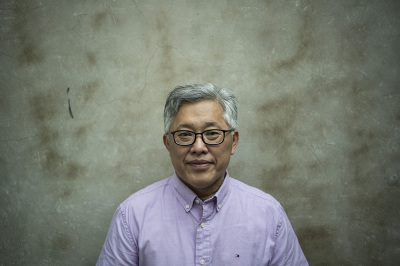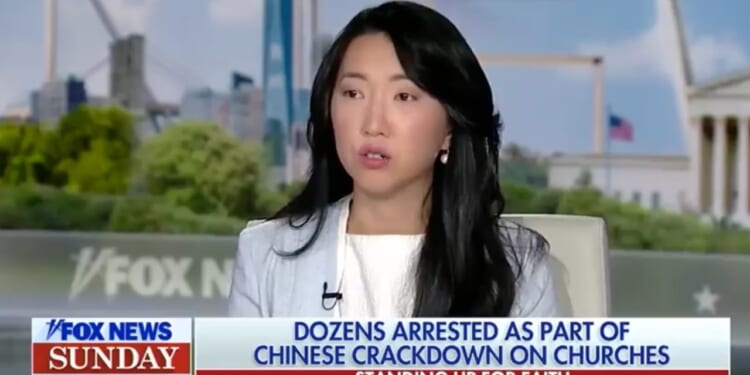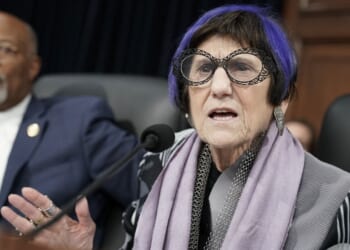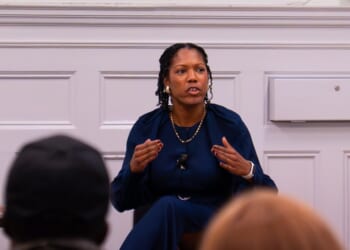
The daughter of a prominent Chinese pastor, who was recently swept up in the Chinese Communist Party’s (CCP) crackdown against the underground church, urged Christians not to forget about their persecuted brothers and sisters in China.
“We know that we are part of a global Christian community, and so we just call out for prayer and call out not to forget us and not to forget the Christians in China,” Grace Jin Drexel said during an interview that aired on “Fox News Sunday.”
An American citizen whose father, Pastor Ezra Jin Mingri, was detained at his home in Beihai, Guangxi Province, on Oct. 10, Drexel said her father was accused of illegally disseminating information online, but suggested the charge is trumped-up and politically motivated.
She said her father is now being held at a detainment facility in the city, and a copy of Jin’s detainment notice obtained by the BBC notes that he is being held at Beihai Number Two prison upon suspicion of “illegal use of information networks.”
“But that is just, like, for a very political charge that they just would use for persecution,” said Drexel, who serves as a U.S. Senate staffer in Washington, D.C.
Drexel’s father, who protested during the Tiananmen Square demonstrations in 1989, helped found Zion Church, a non-denominational Evangelical congregation that emerged in 2007 and has grown to be one of China’s largest unregistered house churches.

The church was officially shuttered by authorities in 2018, but has continued to grow in multiple Chinese cities, with many taking part online.
As many as 10,000 participate in services on Zoom, YouTube and WeChat, among other platforms, according to The Wall Street Journal.
Around the same time as Jin’s arrest earlier this month, approximately 30 other leaders and members of Zion Church were either arrested or reported missing from several cities, including Beijing, Shanghai and Shenzhen, according to The New York Times.
Jin’s son-in-law and Grace’s husband, Bill Drexel, who is a fellow at the Hudson Institute, told Fox News that the crackdown against Zion Church members appears to be “the most extensive singular crackdown on any church in China in the last 40 years.”
“So what we’re seeing is a serious escalation across several cities; it’s really nationwide, and this seems like only the beginning,” he added.
Bill Drexel, some of whose work focuses on artificial intelligence competition with China, went on to note that the CCP potentially anticipates a difficult geopolitical time ahead, which he said might be prompting them to clamp down on their population.
“They tend to want to kind of batten down the hatches on their society,” he said of when Chinese authorities perceive trouble on the horizon. “They want to tighten the screws so that they have absolute control in case they’re afraid that there’s public unrest.”
While Grace Jin Drexel said she remains hopeful for her father’s miraculous deliverance, she acknowledged he and the others likely face a difficult legal battle ahead.
“I definitely, as a Christian, I also believe in miracles, and we are calling for a full, unconditional and immediate release of my family, as well as those 21 others who are detained,” she said.
“Unfortunately, just looking at other cases in China, other persecuted Christians, it really would be a miracle if they were able to be released in such a quick and unconditional way,” she continued. “So, we are bracing for a longer potential legal battle and such, but that’s what it seems […] will happen.”
Jin’s case and those of the detainees have drawn the attention of the United States and the Trump administration, with Secretary of State Marco Rubio issuing an Oct. 12 statement condemning the arrests of Jin and others, demanding their release while urging Chinese authorities to allow all people of faith, including those in house churches, to worship freely.
“This crackdown further demonstrates how the CCP exercises hostility towards Christians who reject Party interference in their faith and choose to worship at unregistered house churches,” Rubio said.
“We call on the CCP to immediately release the detained church leaders and to allow all people of faith, including members of house churches, to engage in religious activities without fear of retribution.”
China’s Foreign Minister Lin Jian pushed back against the condemnation from the U.S., claiming he was unaware of the arrests while objecting to “the U.S. side’s interference in China’s internal affairs under the pretext of so-called religious issues,” according to NPR.
Jon Brown is a reporter for The Christian Post. Send news tips to jon.brown@christianpost.com
















